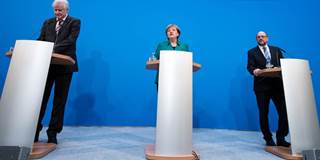German democracy is being strangled by closed-door coalition agreements. Allowing it to breathe requires closing the gap between the political class and the electorate, which is possible only if party leaders embrace more open and flexible legislative agendas requiring real debate in the Bundestag.
BERLIN – The spectacle surrounding the recent talks to form a new coalition government in Germany is a bellwether of voter discontent. The power games, pork barreling, and compromises that have been reached without public debate all underscore the disconnect between Germany’s mainstream parties and the electorate – driving voters directly into the hands of populists.
As a result, Germany’s political fringe is blossoming. The far-right Alternative für Deutschland and the left-wing Die Linke hold a combined total of about a quarter of the Bundestag’s seats. The emerging grand coalition – which includes the conservative Christian Democratic Union (CDU), its Bavarian sister party the Christian Social Union (CSU), and the left-leaning Social Democratic Party (SPD) – holds just over 50%, making it significantly less grand than in the previous two governments.
The AfD, in particular, can’t believe its luck. The party – which is, at best, only partly loyal to democracy – appears set to become the largest opposition group in the Bundestag. For a party that did not even qualify for parliamentary representation until last September’s election, such a prominent position was beyond their wildest dreams.

BERLIN – The spectacle surrounding the recent talks to form a new coalition government in Germany is a bellwether of voter discontent. The power games, pork barreling, and compromises that have been reached without public debate all underscore the disconnect between Germany’s mainstream parties and the electorate – driving voters directly into the hands of populists.
As a result, Germany’s political fringe is blossoming. The far-right Alternative für Deutschland and the left-wing Die Linke hold a combined total of about a quarter of the Bundestag’s seats. The emerging grand coalition – which includes the conservative Christian Democratic Union (CDU), its Bavarian sister party the Christian Social Union (CSU), and the left-leaning Social Democratic Party (SPD) – holds just over 50%, making it significantly less grand than in the previous two governments.
The AfD, in particular, can’t believe its luck. The party – which is, at best, only partly loyal to democracy – appears set to become the largest opposition group in the Bundestag. For a party that did not even qualify for parliamentary representation until last September’s election, such a prominent position was beyond their wildest dreams.